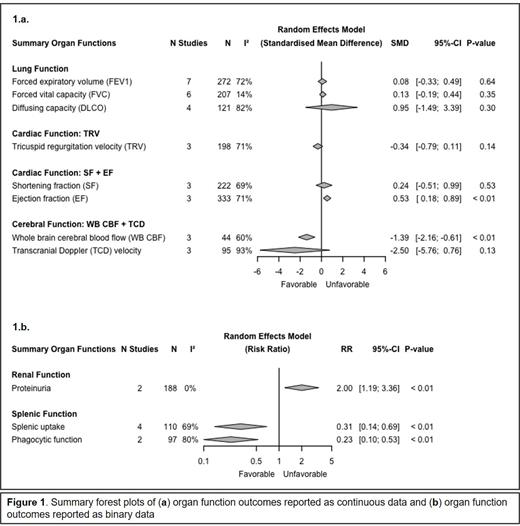Background
Allogeneic hematopoietic stem cell transplantation (HSCT) is the only established curative treatment option for patients with sickle cell disease (SCD). One of the main indications for HSCT is SCD-related organ damage, which is a major cause of morbidity and early mortality. However, whether HSCT is effective in recovering SCD-related organ dysfunction has not been systematically reviewed.
Methods
This is a systematic review and meta-analysis investigating the effects of HSCT on organ function in patients with SCD. We performed a comprehensive search in MEDLINE/PubMed and EMBASE up to June 2023, focusing on studies reporting pulmonary, cardiac, renal, splenic, and/or cerebral function parameters, as well as retinopathy and/or avascular osteonecrosis (AVN) before and after HSCT. Continuous data were analyzed using the weighted inverse-variance random effects meta-analyses, reported as standardized mean difference (SMD) and 95% confidence intervals (95%-CI). Binomial data were analyzed using the Mantel-Haenszel random effects meta-analyses, reported as risk ratio (RR) and 95%-CI. A negative SMD indicates an improvement and a positive SMD indicates a worsening of the measured parameter post-HSCT. A RR <1 indicates a result in favor of the transplantation and a RR >1 indicates a worsening of the measured parameter after HSCT. The ‘Newcastle-Ottawa Quality Assessment Scale’ and the ‘Clinical Diversity in Meta-analysis’ (CDIM) tool were used to assess the quality and the clinical heterogeneity of the studies.
Results
Thirty-two of 476 studies met our inclusion criteria, of which 17 were used for the meta-analyses and 15 for the qualitative part of the review. Of the studies that were included in the meta-analyses, 4 comprised adult patients (n=184) and 13 pediatric and/or young adults <22 years old (n=591). The majority of donors were matched sibling donors (86.4%), and studies with both myeloablative and/or reduced intensity conditioning regimens were included. The CDIM score was low or moderate for all performed meta-analyses, suggesting fair clinical comparability among the studies. Summary plots of the meta-analyses are shown in Figure 1. Pulmonary function test parameters remained stable following HSCT (SMD -0.08, p=0.64 for forced expiratory volume in 1 second; SMD -0.13, p=0.35 for forced vital capacity; and SMD -0.95, p=0.30 for diffusing capacity). Mean tricuspid regurgitation velocity (TRV) did not change significantly in the meta-analysis (SMD -0.34, p=0.14). However, 3 studies used for the qualitative review reported normalization in patients with prior elevated TRV. Whole brain cerebral blood flow improved significantly after transplantation (SMD -1.39, p=<0.01). Several studies reported an absent or very low incidence of new (silent) cerebral infarcts and a decrease of transcranial Doppler velocities following successful HSCT. In pediatric patients, creatinine clearance decreased significantly after HSCT (SMD -0.80, p=0.01) and the presence of proteinuria increased (RR 2.00, p=<0.01). Furthermore, splenic uptake ( 99mTc) and phagocytic function of the spleen improved (RR 0.31, p=<0.01 and RR 0.23, p=<0.01, respectively). Retinopathy and AVN before and after HSCT were investigated in only 1 study in children with SCD, both showing no significant changes post-HSCT.
Discussion and Conclusion
Allogeneic HSCT has the potential to stabilize or recover pulmonary and cardiac function parameters in SCD patients. In pediatric patients, splenic function parameters showed impressive improvement following HSCT. On the other hand, creatinine clearance decreased significantly in children. This might be a reflection of either normalization of SCD-related hyperfiltration or transplantation-related toxicity, which may also have contributed to the increased prevalence of proteinuria after HSCT. With respect to cerebral damage, cerebral perfusion parameters improved and progression of silent cerebral infarctions was prevented following HSCT. Last, we demonstrate a paucity of evidence regarding the course of renal function, retinopathy, and AVN in adult SCD transplant recipients. More research is needed to define which patients with SCD-related organ damage might benefit most from HSCT and which organs are less likely to recover.
Disclosures
Biemond:BMS: Research Funding; Sanquin: Research Funding; CSL Behring: Other: Advisory board; Novartis: Other: Advisory board, Research Funding; Novo Nordisk: Other: Advisory board; Global Blood Therapeutics/Pfizer: Other: Advisory board, Research Funding; Celgene: Other: Advisory board. Nur:VERTEX: Consultancy, Speakers Bureau; Amgen: Consultancy, Speakers Bureau; Novartis: Consultancy, Research Funding, Speakers Bureau.


